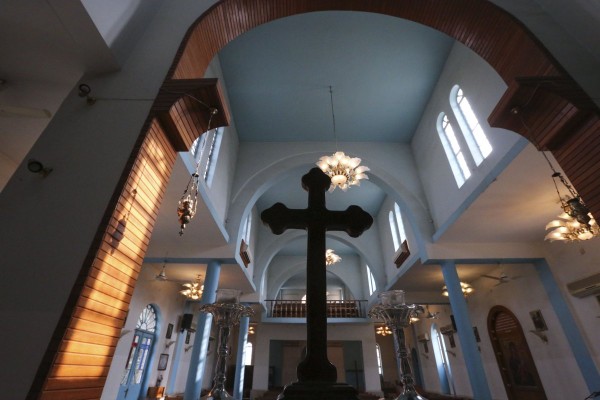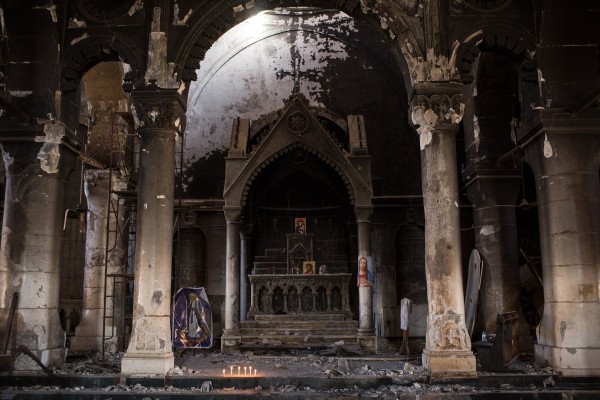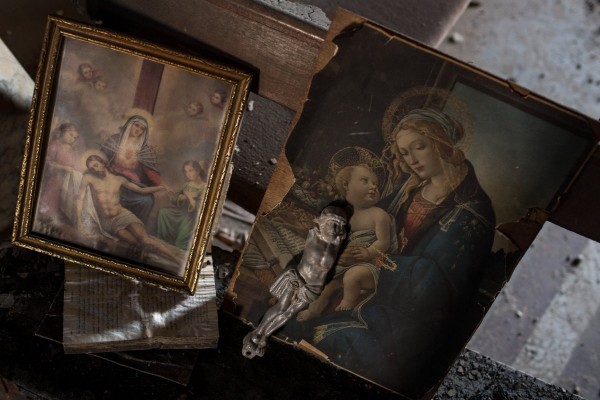
A picture shows a crucifix in the Chaldean Catholic Church of the Holy Trinity in the Iraqi capital Baghdad, on Nov. 7, 2020. SABAH ARAR/AFP via Getty Images
Ishtartv.com - newsweek.com
By Nuri Kino, Jan 30, 2024
Human rights organizations, politicians, and others who fight against
religious persecution of any kind must always remember the persecuted Christians of Iraq and
Syria.
Last year marked two decades since the illegal invasion of Iraq and the
overthrow of dictator Saddam Hussein's regime. It was a war that forever
changed not only Iraq but the entire Middle East. Eight years after the start
of the Iraq War, neighboring Syria was embroiled in a painful internal conflict
and an international proxy war. The number of Christians in both these
countries has drastically declined since 2003.
Christians in Iraq number around 120,000 today, according to the U.S.
State Department—a huge fall in two decades from 1.2 million. Their population
is expected to decline even further. In Syria, the Christian population has
been reduced to 300,000. Before 2011, there were 1.5 million Christians living
there, according to several human rights organizations. Most Christians in
these countries are ethnic Assyrians/Syriacs/Chaldeans and Armenians. The
decline in these Christian populations is due to religious persecution by
terrorists.
In the summer of 2014, after reporting on the wars in Iraq and Syria, I
realized that journalism alone wasn't enough to bring attention to the plight
of Christians and other religious minorities. Several terrorist organizations
had joined together to form one of the world's most dangerous and powerful
units ever created—the Islamic State of Iraq and Syria, also known as ISIS. But
hardly any of the major media outlets, nor the U.S. government or the United
Nations, wanted to draw attention to the religious persecution. My home country
of Sweden continued to deport Christian asylum seekers to Iraq even though the
Iraqi government had asked them to stop, as their safety could not be
guaranteed.
By 2014, it had been 10 years since Al Qaeda beheaded the first
Christian in Iraq on camera, a young man named Raymond Shamoun. The video of
the atrocity was spread all over Iraq, to frighten Christians into fleeing the
country. It worked.
At that time, I posted on Facebook asking for help to draw attention to
the ethno-religious persecution. Within two days we had started the A Demand
For Action (ADFA) campaign—a network of volunteers across the globe working to
stop an unfolding genocide.
We shared articles and posts thousands of times a day, on Facebook,
Twitter, and Instagram. We contributed to tens of thousands of people
demonstrating in cities such as Los Angeles, Chicago, Sydney, and Berlin. We
reached the attention of politicians, mass media, and celebrities. We had all
the documentation, all the facts and sources that were needed. Now politicians
and the media could no longer be quiet.
Unfortunately, we failed in stopping the genocide. But the victims were
given a voice. ADFA is now an established human rights and aid organization.
In December 2022, the U.N. recognized that the Islamic State carried out
war crimes and crimes against humanity against Iraq's Christians. Behind words,
numbers, varying reports, and decisions about what to call the violence are the
people affected by the atrocities.
We at ADFA recently decided to interview refugees from Iraq and Syria,
forgotten victims of ethnic and religious cleansing, living in Beirut.
Our report, The Elephant In The Room—The Forgotten Plight of Christians
in Iraq and Syria, was produced by Lebanese artist and TV presenter Layal
Nehme. We visited many Assyrians/Chaldeans/Syriacs and Armenians in Lebanon's
capital. In the report, we asked why Christians continue to flee their homeland
even though terrorist organizations such as ISIS have been defeated.
One refugee, Raghad Abdallah Matti, said that they could not afford the
ransom money the terrorists demanded for his brother. Both his parents died of
grief within months of the kidnapping. Raghad's brother has been missing since
2014.
In Lebanon, Raghad does not have the right to work, to health care, and
his children do not have the right to education. He, just like everyone else,
is left to the winds. Completely forgotten. ADFA's proposal and demand is that
those who want to return to their home countries should be given the
opportunity to do so. They must feel safe and secure.
The refugees in Lebanon, and in other neighboring countries, such as in
Jordan and Turkey, need financial help. They must be able to buy food and seek
medical care. Those who want and have applied to move to Western countries,
such as to Australia, Canada, or somewhere in Europe, should be prioritized in
the asylum system.
The most affected by numbers by the wars in Iraq and Syria are Shiite
and Sunni Muslims. But Indigenous Peoples such as Assyrians/Syriacs/Chaldeans,
Armenians, and Yezidis are threatened with ethno-religious cleansing. We would
have preferred to see them safely return to their home countries. But the vast
majority of them refuse to do so out of fear of persecution, as outlined in our
report.
The international community must not forget these victims of
ethno-religious cleansing. Their continued suffering, as survivors of crimes
against humanity, testifies to the failure of the international community at
large. By writing the report and participating in the International Religious
Freedom Summit in Washington, D.C., on Jan. 30-31, we hope for real change.
Raymond Shamoun must have a voice again. His brutal murder and the
consequences of the violence that followed must not be forgotten. The
Christians of Iraq and Syria are not yesterday's news. They are human beings.
Human rights organizations, politicians, and others who fight against religious
persecution of any kind must always remember and consider them.
*Nuri Kino
is an independent investigative multi-award-winning reporter and
minority rights expert.

The burnt and destroyed interior of the St. Mary al-Tahira church is seen on Nov. 8, 2016, in Qaraqosh, Iraq. The town was largely destroyed with all of the churches burned or heavily damaged by ISIS. Chris McGrath/Getty Images

Damaged prints of Jesus Christ are seen inside the burnt and destroyed interior of the St. Mary al-Tahira church on Nov. 8, 2016, in Qaraqosh, Iraq. Chris McGrath/Getty Images
|